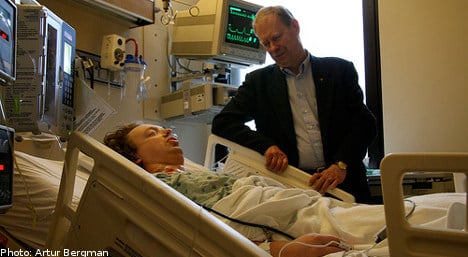In addition, wait lists for orthopaedic surgery are 27 percent shorter for the higher income earners, according to a doctoral thesis written by health economist Gustav Tinghög of Linköping University.
Tinghög used all of central Sweden’s Östergötland county council’s 4,634 wait lists in 2007 for his research, comparing the wait times of the patients to their socioeconomic backgrounds.
“We find unequal access in many aspects of society, such as queueing for an apartment, so we would be surprised not to see different queue times in health care. We thought we would find more inequality in access, but there is none in gender.”
However, there was not a discernable difference in cardiology, gynaecology, urology and ophthalmology, nor did there appear to be discrimination due to ethnicity or gender.
“I haven’t explicitly investigated why, but I have a theory. Those areas have shorter waiting times. Orthopaedic and general surgery are the specialisations with the longest waiting times,” he said.
“With shorter waiting times, one can prepare family and work ahead of time, while some don’t want to have surgery right away, so they aren’t as active in getting the surgery,” Tinghög added.
However, once the waiting time is longer than 100 days, the urgency elevates and patients attempt to “manipulate” the system, according to Tinghög.
“They know who to talk to, they have connections, they know what chord to strike to get priority. That’s a possible explanation, I’m not saying that is the case,” he said.
“They’re in contact with the doctors and adminstrative personnel. The patient might be more powerful and equipped to know how the system works. These are issues, i’m just speculating,” he added.
Tinghög noted that it is unavoidable that certain patients will be prioritised within the public system. The title of Tinghög’s thesis is “The art of saying no.”
One area Tinghög analysed was whether certain areas of health care should be paid for publicly or privately.
“It is not always crystal clear right now on what grounds it should take place. Glasses, for example, we pay ourselves, while the county council is responsible for hearing aids,” he pointed out.
He also analysed the issue of responsibility, questioning whether obese individuals and smokers should pay for own care despite consciously contributing to their problems. Tinghög believes it is ethically difficult to retroactively impose such demands.
However, high tobacco taxes on tobacco or expensive insurance for risky activities as deep sea diving also prevent certain behaviours and lifestyles, he noted.
Tinghög also covered organ donation, proposing a high level of financial compensation to entice more individuals to donate their relatives’ organs.
“It is very repugnant that we should pay or exchange money for bodily parts. I’m not sure these rationales are based on reasons, they’re more emotional. It’s my job to questions these kinds of emotions,” he said.
“I don’t see any reason why we can’t pay deceased donors or families to increase the level of organ donations. If we can get more people to donate, we will avoid immense amounts of suffering,” he added.
Instead, people travel to poor countries to buy organs where there is a lack of professional health care to help the donors if they have problems later.
Tinghög is one of four graduate students funded by Östergötland county council to research the effects of priority lists for health care services introduced in the autumn of 2003, a move which generated a heated ethical debate at the time. He will defend his dissertation on Friday.


 Please whitelist us to continue reading.
Please whitelist us to continue reading.
Member comments